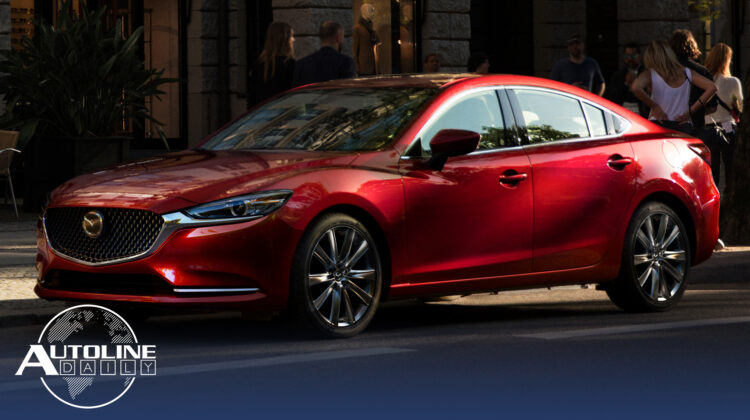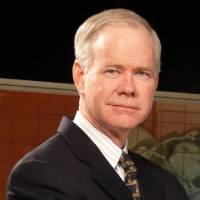
Follow us on social media:
Runtime: 7:29
0:07 Official Audi E-Tron Range Underwhelming
1:00 Daimler Opens New Battery Factory in Germany
1:33 Volkswagen Secures Lithium from Chinese
2:00 Rise of the E-Machines
2:43 Tesla’s Autopilot Can Now Change Lanes
3:44 Mercedes Teases Interior of New Crossover
4:06 Mazda6 No Longer Comes with A Manual
4:56 Bright Future for Contract Manufacturing?
Visit our sponsors to thank them for their support of Autoline Daily: Bridgestone and Dow Automotive Systems.
This is Autoline Daily reporting on the global automotive industry.
OFFICIAL AUDI E-TRON RANGE UNDERWHELMING
Audi released the official EPA range for its first fully electric vehicle, the e-tron and the distance is underwhelming. Its 95-kWh battery pack delivers 204-miles of range. That compares to the Jaguar I-PACE’s 90 kWh battery and 234-miles of range and Tesla’s 289-miles with the 100-kWh battery in the Model X. At least one reason for the shorter distance is that Audi engineered the pack to only use 88% of its total capacity or 83.6 kWh, to ensure “battery longevity, repeatable performance and peak charging power for longer amounts of time during the charge cycle.” That means from a technical standpoint, Audi is not as advanced.
DAIMLER OPENS NEW BATTERY FACTORY IN GERMANY
Automakers are starting to bring more electric vehicle components in-house. Daimler just broke ground on a new battery factory in Germany to assemble battery packs for Mercedes’ EQ lineup of electric vehicles. This new facility is part of a more than one-billion-euro investment the company is making to expand its global battery production network. If EVs really catch on, automakers worry that there will be a shortage of battery capacity, so we’ll probably see other automakers contemplating a similar move.
VOLKSWAGEN SECURES LITHIUM FROM CHINESE
Volkswagen is also strengthening its battery supply chain. It signed a deal with the Chinese company Ganfeng to supply it and its suppliers with lithium for the next ten years. VW plans to introduce 70 new pure electric models over the next decade, and needs a stable supply of lithium. The two companies also agreed to cooperate on battery recycling and solid-state batteries.
RISE OF THE E-MACHINES
Here’s a new term you may want to add to your vocabulary. We’re increasingly hearing EV experts refer to electric motors as e-machines. The term, in this case, seems to be coming out of Europe. So if you want to sound like you’re up to speed in all things electric, start throwing e-machines into your vocabulary, when you’re talking about electric cars.
TESLA’S AUTOPILOT CAN NOW CHANGE LANES
Last year, Tesla introduced an enhanced version of its Autopilot system that automatically changes lanes, but drivers had to confirm lane changes by using the turn stalk. Thanks to an OTA update, Tesla’s can now make lane changes without any driver confirmation. It’s doesn’t make the car autonomous since the driver has to keep their hands on the wheel for the system to work. It’s available now to customers in the U.S. who have Enhanced Autopilot or Full Self-Driving Capability and the company will roll it out to other markets after more validation and regulatory approval.
Speaking of Tesla, if you haven’t done so already, check out yesterday’s Autoline After Hours with Sandy Munro. He gave us his views of the Chinese version of the Tesla Model 3. As always it was a fascinating show with Sandy. You can watch it now on our website, Autoline.tv or just look for it on our YouTube channel.
MERCEDES TEASES INTERIOR OF NEW CROSSOVER
Mercedes is showing off the interior of its upcoming GLB crossover. The company didn’t reveal any details but as you can see it’s similar to the interior of the recent A and B Class and the CLA. The GLB makes its debut at the Shanghai auto show, which kicks off later this month.
MAZDA6 NO LONGER COMES WITH A MANUAL
The slow death of the manual transmission continues. Mazda announced the 2019 version of the Mazda6 will no longer have the option. It also comes standard with G-Vectoring Control Plus to improve steering response and Mazda’s suite of safety features, which when combined with the manual going away, raises the base price of the Mazda6 by nearly $2,000. And yet another reason why someone might want to opt for the 2018 model.
BRIGHT FUTURE FOR CONTRACT MANUFACTURING?
Car companies make their own cars, except when they don’t have the capacity or are not keen on building a new billion-dollar assembly plant. Then they can turn to contract manufacturers. Right now, there are three contract manufacturers in the world and they’re all in Europe. Nedcar in the Netherlands makes some models of the Mini. Valmet in Finland and makes Mercedes GLCs. Magna Steyr in Austria makes the Mercedes G-Wagon, the Jaguar E-Pace and I-Pace, the new Toyota Supra and BMW Z4, and the BMW 5-Series. Contract manufacturing used to be more common. Karmann in Germany famously made the Karmann Ghia for Volkswagen and even the Chrysler Crossfire but later went bankrupt. Bertone in Italy made the 780 sedan for Volvo and later went bankrupt. In the United States AM General made the Hummer H1 and H2 for General Motors and more recently made the Mercedes R-Class who then exported them all to China. But it recently sold its plant to SF Motors, a ride sharing startup that plans to make its own vehicles. With all the EV and mobility startups racing to get into the auto industry, contract manufacturing could make a comeback. Magna is building an assembly plant in China to make electric cars for BAIC, and in the US, the startup Evelozcity approached Magna to make cars. Automakers have already outsourced about 80% of the components of a car to suppliers. Could outsourcing final assembly be next on their list? As the move to autonomy and mobility strains automakers financially the future could start to look bright for contract manufacturers.
And that wraps up today’s show and wraps up another work week. Thanks for watching and join us again on Monday.
Thanks to our partner for embedding Autoline Daily on its website: WardsAuto.com

John McElroy is an influential thought leader in the automotive industry. He is a journalist, lecturer, commentator and entrepreneur. He created “Autoline Daily,” the first industry webcast of industry news and analysis.




